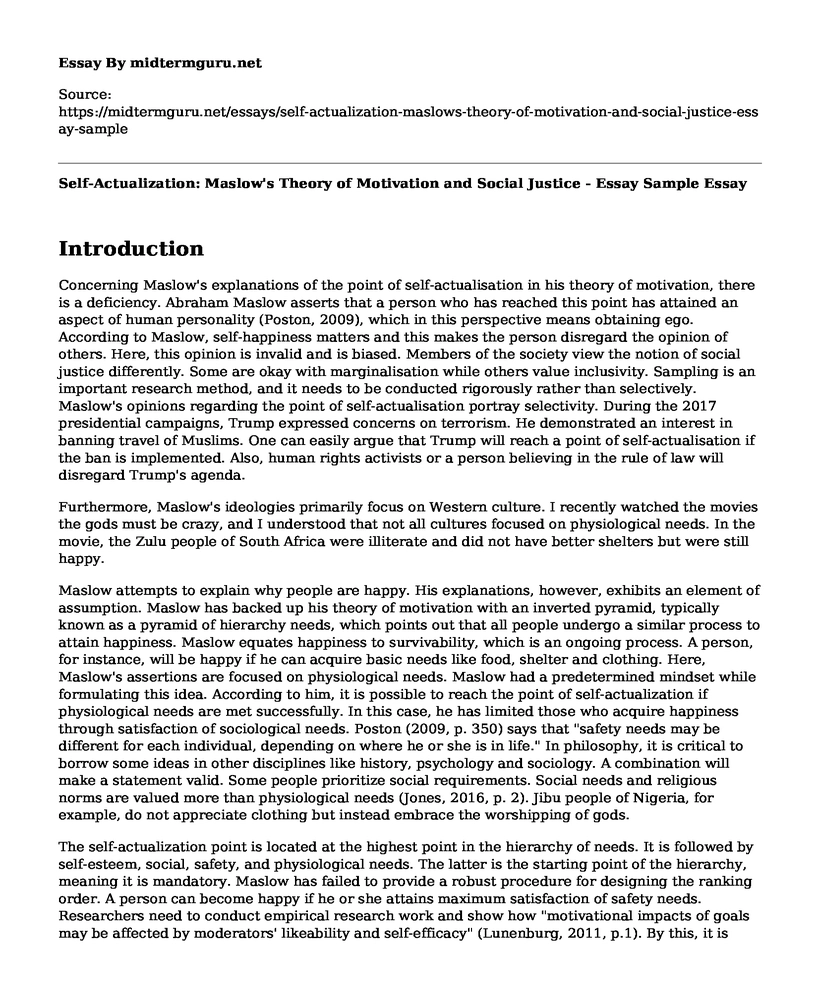Introduction
Concerning Maslow's explanations of the point of self-actualisation in his theory of motivation, there is a deficiency. Abraham Maslow asserts that a person who has reached this point has attained an aspect of human personality (Poston, 2009), which in this perspective means obtaining ego. According to Maslow, self-happiness matters and this makes the person disregard the opinion of others. Here, this opinion is invalid and is biased. Members of the society view the notion of social justice differently. Some are okay with marginalisation while others value inclusivity. Sampling is an important research method, and it needs to be conducted rigorously rather than selectively. Maslow's opinions regarding the point of self-actualisation portray selectivity. During the 2017 presidential campaigns, Trump expressed concerns on terrorism. He demonstrated an interest in banning travel of Muslims. One can easily argue that Trump will reach a point of self-actualisation if the ban is implemented. Also, human rights activists or a person believing in the rule of law will disregard Trump's agenda.
Furthermore, Maslow's ideologies primarily focus on Western culture. I recently watched the movies the gods must be crazy, and I understood that not all cultures focused on physiological needs. In the movie, the Zulu people of South Africa were illiterate and did not have better shelters but were still happy.
Maslow attempts to explain why people are happy. His explanations, however, exhibits an element of assumption. Maslow has backed up his theory of motivation with an inverted pyramid, typically known as a pyramid of hierarchy needs, which points out that all people undergo a similar process to attain happiness. Maslow equates happiness to survivability, which is an ongoing process. A person, for instance, will be happy if he can acquire basic needs like food, shelter and clothing. Here, Maslow's assertions are focused on physiological needs. Maslow had a predetermined mindset while formulating this idea. According to him, it is possible to reach the point of self-actualization if physiological needs are met successfully. In this case, he has limited those who acquire happiness through satisfaction of sociological needs. Poston (2009, p. 350) says that "safety needs may be different for each individual, depending on where he or she is in life." In philosophy, it is critical to borrow some ideas in other disciplines like history, psychology and sociology. A combination will make a statement valid. Some people prioritize social requirements. Social needs and religious norms are valued more than physiological needs (Jones, 2016, p. 2). Jibu people of Nigeria, for example, do not appreciate clothing but instead embrace the worshipping of gods.
The self-actualization point is located at the highest point in the hierarchy of needs. It is followed by self-esteem, social, safety, and physiological needs. The latter is the starting point of the hierarchy, meaning it is mandatory. Maslow has failed to provide a robust procedure for designing the ranking order. A person can become happy if he or she attains maximum satisfaction of safety needs. Researchers need to conduct empirical research work and show how "motivational impacts of goals may be affected by moderators' likeability and self-efficacy" (Lunenburg, 2011, p.1). By this, it is easier for other researchers or readers to back up their opinions.
Conclusion
In conclusion, Maslow's theory of human motivation is useful to Western people. From the hierarchy of needs, social needs are placed centrally. People are connected after attainment of self-awareness. In the American Dream, for example, Americans can attain happiness if physiological safety, social and self-esteem needs are met and should be in that order. Also, Americans need to implement Abraham Maslow's theory of motivation if they are to implement policies of the American Dream successfully. The American Dream means the provision of equal opportunities for Americans to acquire economic, social and political benefits.
References
Jones, W.J., 2016. The Process of Self-Actualization among Three Historic African American Leaders. Pacifica Graduate Institute.
Lunenburg, F.C., 2011. Goal-setting theory of motivation. International Journal of Management, Business, and Administration, 15(1), pp.1-6.
Poston, B., 2009. Maslow's hierarchy of needs. The Surgical Technologist, 41(8), pp.347-353.
Cite this page
Self-Actualization: Maslow's Theory of Motivation and Social Justice - Essay Sample. (2023, Jan 14). Retrieved from https://midtermguru.com/essays/self-actualization-maslows-theory-of-motivation-and-social-justice-essay-sample
If you are the original author of this essay and no longer wish to have it published on the midtermguru.com website, please click below to request its removal:
- Steve Jobs: Revolutionary Leader
- Ethics in Social Science - Paper Example
- The Quality and Safety Education for Nurses (QSEN) - Paper Example
- Video Analysis Essay on Unfolding the Laundry
- Movie Analysis Essay on Frankenstein 1931 & 1973
- Puritans: A Bible-Based Family & Society - Essay Sample
- Effective Communication: Key to Successful Teaching & Learning - Essay Sample







